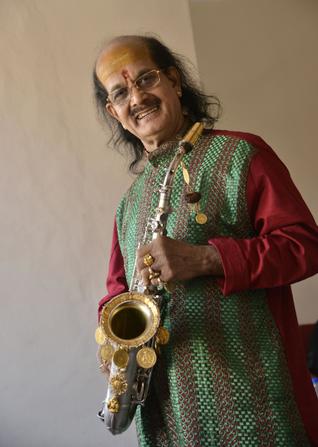 When the Belgian instrument maker Adolphe Sax invented the saxophone in 1840, little would he have imagined that his invention would be the source of memorable Carnatic melodies. “I am thankful to the great man,” said saxophonist Kadri Gopalnath.
When the Belgian instrument maker Adolphe Sax invented the saxophone in 1840, little would he have imagined that his invention would be the source of memorable Carnatic melodies. “I am thankful to the great man,” said saxophonist Kadri Gopalnath.
Gopalnath was in the city for a concert. But this time, it was something more that his pitch-perfect performance that caught our eye. “I’m proud to have been using this 100-year-old instrument for the last few months,” he said, pointing to the “1914” manufacture date on his German silver Cannonball saxophone.
He bought the instrument from an antique musical instrument store in South Carolina, the U.S. The maestro is happy that he could zero-in on “just what he wanted”, as the instrument’s narrow piped bore, masterfully crafted a century ago, is still enabling him to play the finer gradations with precision.
Praising the “accuracy of its 26-key and pad placement”, he said, “It seems as if the anu-swaras are easier to handle for the oscillations, even as my blow and press on the swara-stanas seems 50 per cent easier, I am saving my energy.”
Inconvenient
For Gopalnath, with the alto sax he used for nearly five decades, the bass was always a matter of concern, as the violinist would have to fine tune the instrument to suit the deep tenor of the wind instrument. The spaced out keys and the wider pipe were inconvenient for his style and genre. “To tackle the gamaka-oriented Indian melodies, I did some research and brought in modifications in my blow, as the lung power needed was immense. I also altered the pads and fastened some keys with rubber strips,” he explained.
But, he says, his “new possession”, is a delight as “the violins merge easily to the C pitch”. He recollected his recent concert at the Chembai Sangeeta Utsav in Guruvayoor where he received the Chembai award and inaugurated his new saxophone.
For a man brought up by a vocalist father, Thaniyappaya, in Mangalore, with traditional nadaswara, watching the Mysore palace band as a young boy was a turning point.
He chose to take up the saxophone and the rest, as they say, is history. Kadri is now synonymous with saxophone
